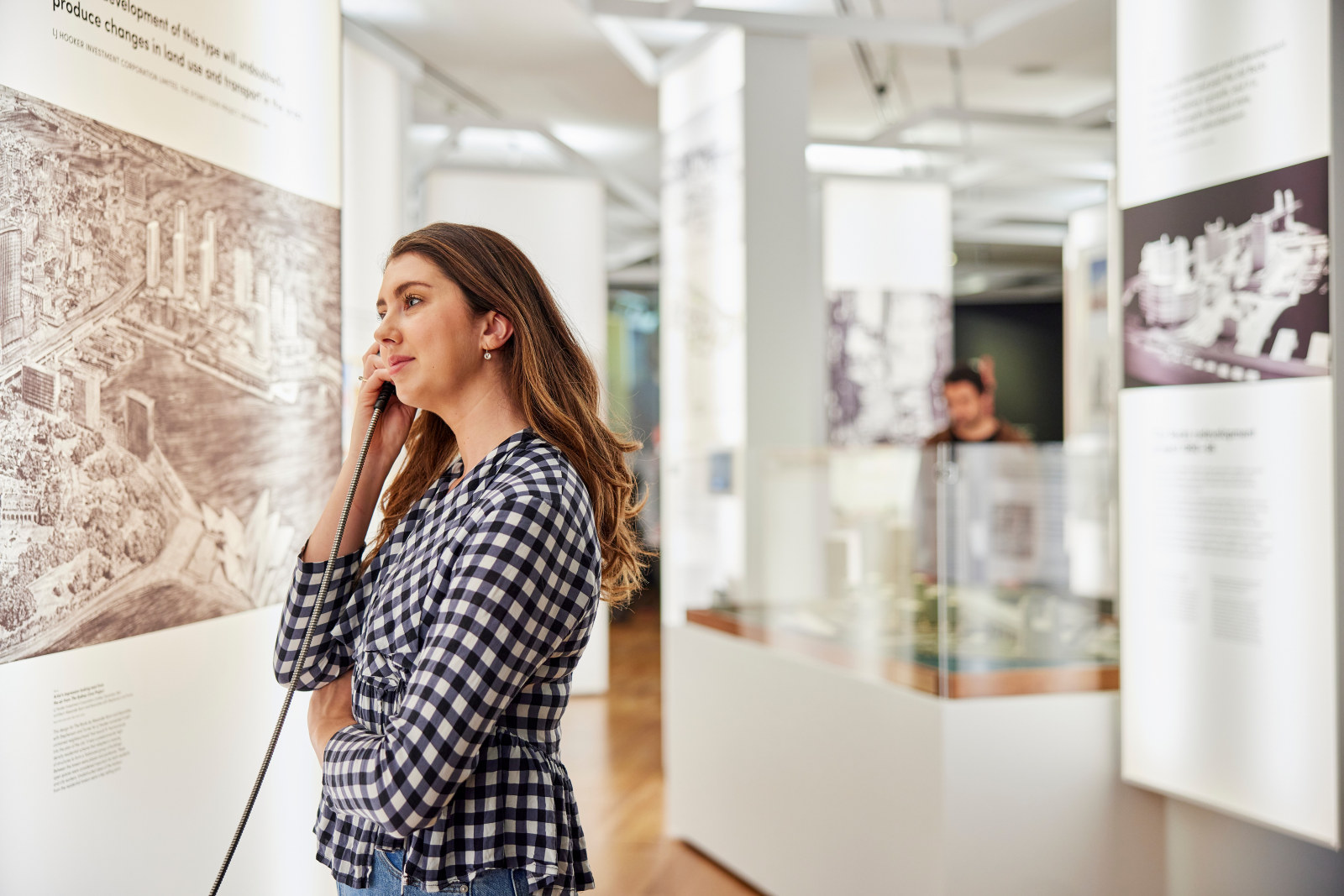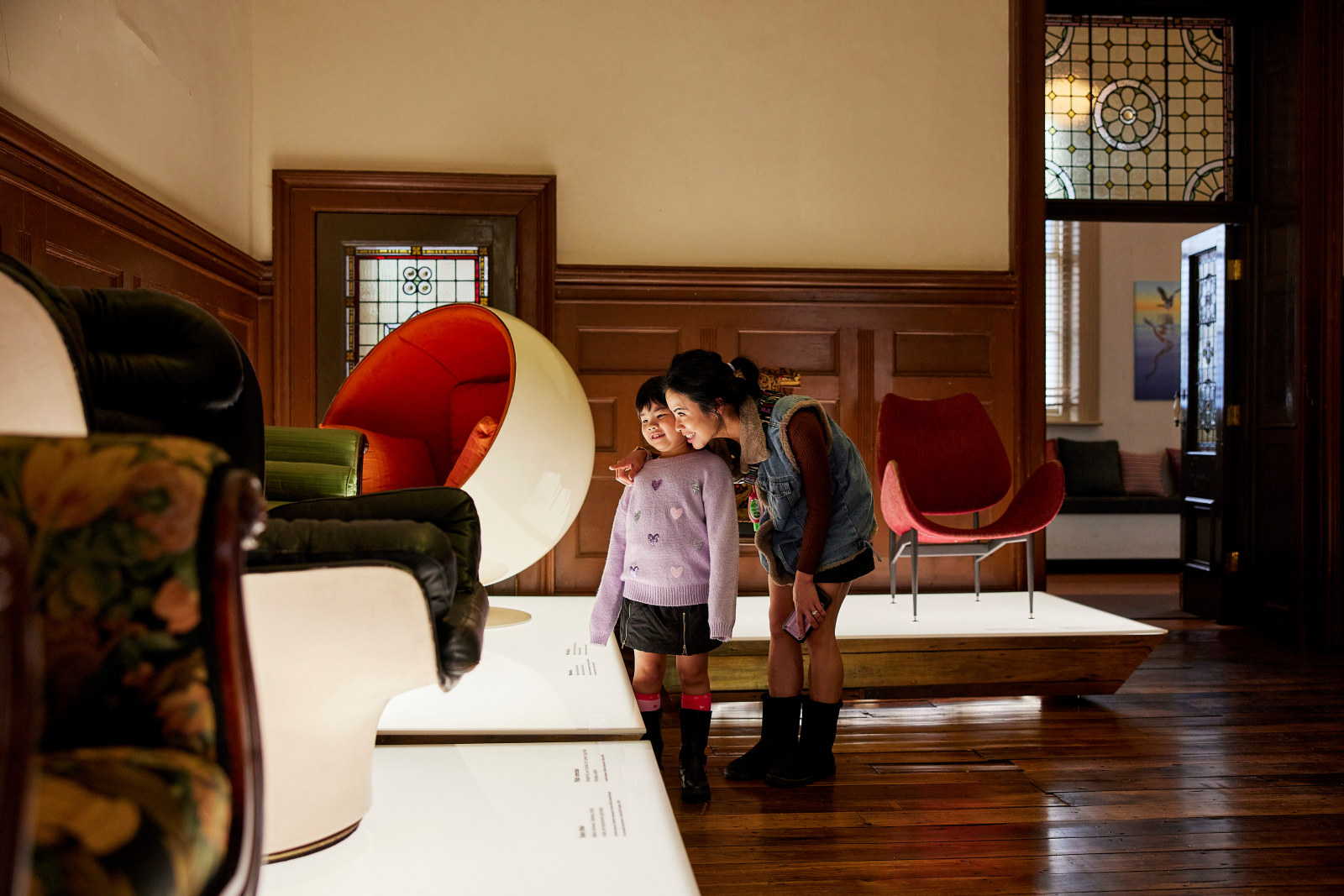Our people
To present varied and rich perspectives on history, we have a diverse and dedicated team. Some work for us as staff; many more as volunteers, supporters and partners. Without their time, effort and energy, we simply could not do the work we do.
This dynamic mix of people, passion and ideas is held together with common purpose and direction through the guidance of our Board and Executive team.
Our Board
Our Board members are responsible for setting the general policies and strategic direction of Museums of History NSW. Appointed by the Governor of New South Wales on the recommendation of the NSW Minister for the Arts, they bring a diverse range of expertise and experience in history, the archival profession, heritage, First Nations cultures and more. The Board is an advisory body and members are not remunerated for their Board activities.
Board members can be appointed for a term of up to three years and can serve a maximum of three consecutive terms.
Bob Carr is the longest continuously serving premier in NSW history. During his tenure (1995–2005), the NSW Government set new records for spending on infrastructure, became the first government in the state’s history to retire debt, hosted the ‘world’s best Olympics’ in 2000 and achieved the nation’s best school literacy levels.
As premier, Bob received the World Conservation Union International Parks Merit Award for creating 350 new national parks. He introduced the world’s first carbon trading scheme and curbed the clearing of native vegetation. He was a member of the International Task Force on Climate Change and was made a life member of the Wilderness Society.
Bob has served as Australia’s foreign minister (2012–13), and as Director of the Australia–China Relations Institute, and is Professor of Industry in Climate and Business at the University of Technology Sydney. In July 2024, he was appointed Chair of the Australian Heritage Council.
Bob is a recipient of the Fulbright Distinguished Fellow Award Scholarship, and has served as Honorary Scholar of the Australian American Leadership Dialogue. He is the author of Thoughtlines (2002), What Australia means to me (2003), My reading life (2008), Diary of a foreign minister (2014) and Run for your life (2018).
Loretta Di Mento is a non-executive director and advisor holding multiple board and audit committee roles for government agencies and not-for-profit organisations, primarily in the health and education sectors.
Formerly an audit partner with Ernst & Young (EY) Sydney, Loretta brings more than 25 years’ experience, providing a range of professional services to listed, private and fast-growth companies. She has specific expertise in corporate governance, risk management and finance in not-for-profit and entrepreneurial organisations.
Loretta has a Bachelor of Commerce from the University of New South Wales, is a member of Chartered Accountants Australia and New Zealand and a member of the Institute of Company Directors.
Loretta is a former member of the Sydney Living Museums Board of Trustees.
Anna Clark is an award-winning historian, author and public commentator. An internationally recognised scholar in Australian history, history education and the role of history in everyday life, Anna’s most recent books are The Catch: Australia’s Love Affair with Fishing (Penguin 2023) and Making Australian History (Penguin 2022). She is currently Professor of History at the University of Technology Sydney.
Anton Enus, a broadcast journalist for the past 40 years, has been presenting SBS world news bulletins since 1999.
He began his career at the South African national broadcaster SABC as a radio news reporter, later working as a parliamentary correspondent, current affairs producer, TV news reporter and TV presenter, sometimes anchoring the breakfast news show Good morning South Africa.
Anton was part of the team that covered South Africa’s historic return to democracy in 1984, and at the time of migrating to Australia he was presenting the prime-time national news.
In addition to SBS world news, Anton has also hosted the discussion forum Insight, as well as special broadcasts for the Sydney Harbour Bridge Walk for Reconciliation, the response to the Cronulla beach riots, and – for a decade – the Walkley Awards for Excellence in Journalism.
He is a regular host at the Sydney Writers’ Festival, Adelaide Writers’ Week and other literary events.
Anton is an ambassador for Bowel Cancer Australia and a patron of Out For Australia, which supports LGBTIQ+ in the workplace.
Dylan Mooney is a proud Yuwi, Torres Strait and South Sea Islander man from Mackay in North Queensland. He works across painting, printmaking, digital illustration and drawing.
Influenced by history, culture and family, Dylan responds to community stories, current affairs and social media. Armed with a rich cultural upbringing, he now translates the knowledge and stories passed down to him, through art. The digital medium’s backlit display allows the artist, who is legally blind, to produce a high-impact illustrative style with bright, saturated colour that reflects his experiences with keen political energy and insight. This blending of digital technology and social commentary is a uniting of the artist’s sense of optimism – pride within the works exude profoundness and substance.
Dylan is among artists who are rethinking digital technologies and artistic practices to consider contemporary issues around identity, desire and representation. Interested in the ways in which we can reframe the conversation around some of the voices that have been left out, the artist has made an important body of work that embodies a shift in representation of queer love among people of colour.
Penelope Seidler AM, LFRAIA is the CEO of the Sydney architectural firm Harry Seidler & Associates and is a generous supporter and patron of the arts. She was inducted as a Life Fellow of the Royal Australian Institute of Architects (RAIA) in 2010 and received an Honorary Doctor of Letters from the University of New South Wales in 2011. Penelope was made a Member of the Order of Australia (AM) in 2008 and was the recipient of the Sydney Alumni Award for Cultural Contribution in 2017.
Penelope has sat on the International Council of the Museum of Modern Art, New York, since 1973 and was a director of the Biennale of Sydney from 2010 to 2019. Penelope served as a Sydney Living Museums Trustee, was a member of the Australian Commissioners Council for the Venice Biennale from 2005 to 2013, is a former member of the National Gallery of Australia (NGA) Council and has been a member of the NGA Foundation since 2006.
Rob Stokes is Industry Professor in Environment and Sustainability at Macquarie University. He is Chair, Faith Housing Australia, and Macquarie Park Innovation District. Rob sits on the boards of the Royal Australian Institute of Architects and The King’s Foundation Australia and serves as an Expert Member of the Australian Government Urban Policy Forum. He previously served as NSW Minister for Infrastructure, Planning, Education, Environment and Heritage. Rob is passionate about people and fascinated by places. He has completed a Master of Science at Oxford and a PhD in law at Macquarie.
Sharon Veale is a partner and the Chief Executive at GML Heritage. With a background in urban planning and public history, she has extensive experience in heritage conservation and management, and interpretation of world, national, state and locally listed heritage places for public and private sector clients and communities. She is a sessional lecturer at the University of New South Wales and is a board member of the Greater Sydney Parklands Trust and Ausheritage.
Sharon is a former member of the National Parks and Wildlife Advisory Council and she served as a Sydney Living Museums Trustee from 2017 to 2021. She is a member of the Planning Institute of Australia and a full international member of ICOMOS.
Simon Froude is Director-General of National Archives of Australia, commencing in the role in May 2022. Prior to joining National Archives, Simon was Director and State Archivist at State Records of South Australia, where he was responsible for the preservation and accessibility of some of the state’s most important historical records, as well as records and information management, freedom of information and privacy, for the South Australian Government.
As Director-General, Simon is leading National Archives through the next phase of its transformation to ensure it continues as a beacon for best practice management of the official records of the Commonwealth of Australia, and that Australian Government information of enduring significance is secured, preserved and available to government agencies, researchers and the community.
Simon’s driving passion is to improve the accessibility of Australia’s rich culture and history.
Executive team
The Executive team brings a wealth of experience, insight and energy to providing strategic and operational leadership, guiding our staff of over 350 and the daily work that goes on across our six core divisions and additional special projects.
Annette joined Museums of History NSW as Chief Executive Officer in October 2024. Annette has previously held senior leadership positions in government, the private sector and not-for-profit organisations, including CEO of Create NSW and Group Director of the NSW Buildings and Places business in global design firm AECOM.
Annette is passionate about art, culture and architecture, and is deeply interested in activating heritage assets, leveraging them to tell stories that are important to our community identity and finding ways to enable adaptive reuse and public engagement. She has led a number of transformational civic projects, including the Walsh Bay Arts Precinct, Hamer Hall at Arts Centre Melbourne, The Gunnery, Theatre Royal, Connecticut Science Center and the Melbourne Park Tennis Centre.
As Chief Operating Officer, Scott leads finance, commercial and museum operations, driving the organisation’s vision with a strong commitment to sustainability and innovation. He focuses on optimising resource allocation, achieving operational excellence, and fostering strategic growth to enhance diverse engagement with our collections while preserving our rich heritage. Scott is passionate about creating a collaborative environment that empowers teams to excel and be agile in times of change.
Scott has 14 years of leadership experience in the NSW Government across finance, strategy and systems, and has collaborated with various cultural and infrastructure agencies to ensure responsible financial stewardship and positive performance outcomes. He also brings extensive expertise in the private sector, particularly in commercial operations, change management and financial oversight within service and logistics industries.
Martyn leads the Collections division as Director with oversight of the care, management, and accessibility of our collections, most notably the State Archives Collection, the Caroline Simpson Library & Research Collection and house museum collections. Ensuring the proper transfer of material including transfer of records into the State Archives Collection and their documentation; their care through conservation; providing services for the public to access the collections. This division is supported by key business units – Access Services, Collections Care, and Collection Services.
Martyn also occupies the role of Executive Director, State Records NSW. This current arrangement acknowledges the importance of the cohesion of the records continuum and will contribute to a seamless customer service for our public office stakeholders – stakeholders who are vital to the work of both MHNSW and State Records NSW.
Martyn has over 35 years’ experience in the NSW Public Sector. This includes a long association with NSW State Archive and extensive government experience particularly in the area of culture and the arts having worked in a number of roles at Arts NSW (now Create NSW) and in cultural institutions.
As Director Corporate Services, Danielle leads the key operational functions of our organisation across Finance, ICT, Capital Works, People & Culture, and Internal Communications. Danielle is responsible for leading the creation and implementation of strategies that enable and support day-to-day business operations, with a strong focus on strengthening corporate capability, planning and performance monitoring.
Danielle has over 16 years’ experience in senior roles within NSW government, in a wide range of corporate areas, including extensive experience in the strategic leadership of people and projects, driving the achievement of key organisational priorities as well as business critical operations. Danielle’s major achievements include leading the Service NSW response to the 2020 cyber breach and driving rapid policy change at a cluster and whole of government level as a member of the COVID taskforce at Transport for NSW.
Ben leads the commercial services division which operates the Government Records Repository (GRR), a world-class storage, digitisation, information processing and logistics service and facility for semi-active records created by NSW public sector bodies, including government agencies, local councils, public hospitals and universities. Ben’s division generates significant revenue that underpins the financial sustainability of the organisation.
Ben has over 25 years’ experience in records management service provision, with a focus on warehousing, logistics and digitisation services. Working across the public and private sectors, Ben has gathered deep experience in a number of roles, particularly in operations and systems areas, with over nine years at the general manager and director level.
Rebecca leads the programming, production and audience division which is responsible for curatorial and research, digital and design, production and experiences, audience and marketing, and First Nations cultural engagement.
Rebecca has over 25 years’ experience working in the museum, arts and cultural heritage sectors. Working across a range of content, communications and creative production areas, she manages teams to deliver strong narratives and diverse techniques to ensure multiple perspectives, diverse experiences and broad audience appeal.
Rebecca joined Sydney Living Museums in 2017, and shortly after was appointed project director for the transformational Hyde Park Barracks renewal project, which redefined heritage interpretation for the organisation and had a significant impact in the sector.
Susan leads a visitor-focused team in the sustainable management of MHNSW’s portfolio of 12 historic properties, museums and landscapes. The Museums, Operations and Visitor Services division focuses on the provision of information and access to enhance customer experience, enjoyment and knowledge of our properties. Susan leads MHNSW in the delivery of exceptional customer service, venue hire, retail, volunteer engagement and management, museum operations and horticulture to the highest standards.
Susan has over 20 years’ experience working in national and state museums and cultural heritage sites and has worked in operational and visitor services, exhibitions, publications, curatorial, registration, interpretation, collections and access, building maintenance, site presentation and asset management.
Beth is responsible for leading the delivery of the Parramatta Female Factory Project, an immersive museum experience for the 1821 Female Factory Precinct and related new cultural and educational facilities. Beth has over 20 years’ experience with the organisation, including a strong background in history, exhibition development and project management. Her major achievements include leading curatorial and content for the Hyde Park Barracks renewal project.

Contact us
How can we help? Contact details for head office, media, venue hire, museums and reading rooms
Related

About us
Our central role is to preserve our places and collections for future generations and share the stories of our state

Contact us
How can we help? Contact details for head office, media, venue hire, museums and reading rooms

Policies & plans
We have a range of policies, reports, frameworks and plans that document and guide our work